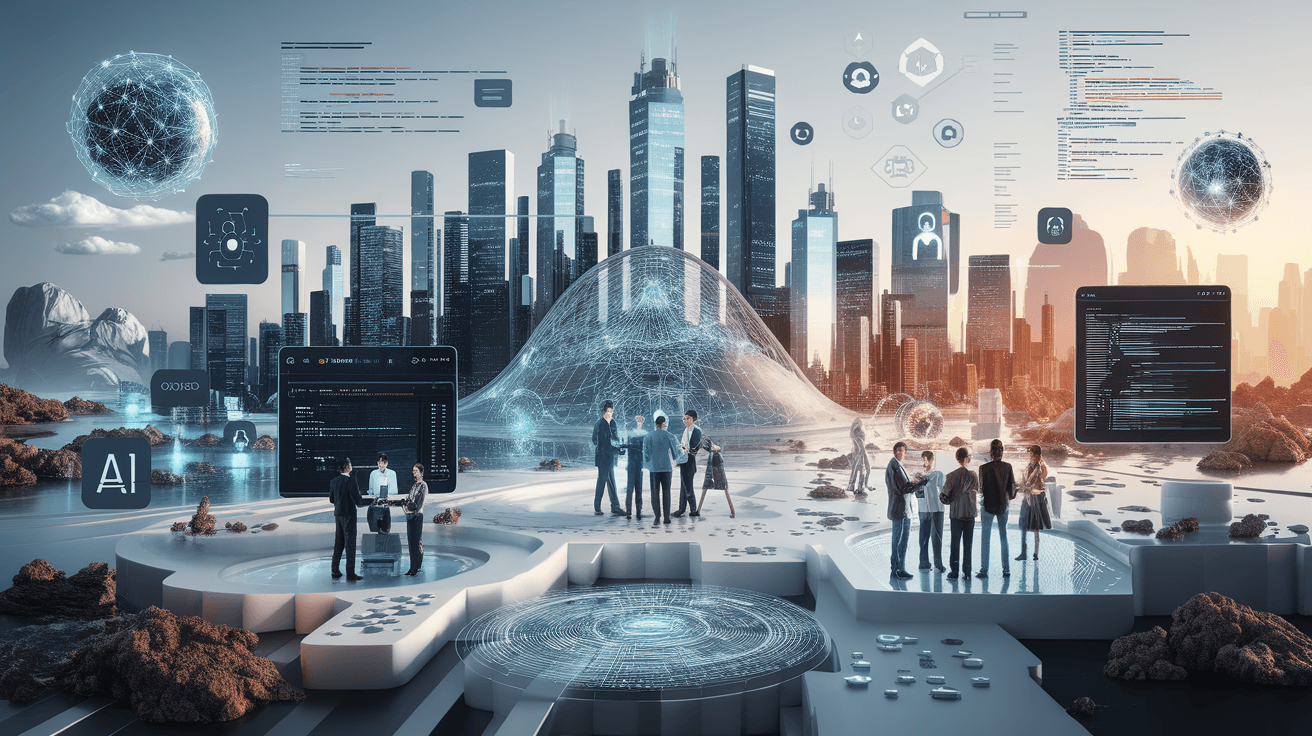AI Revolutionizing Coding: 2025's Transformative Software Landscape

The year 2025 marks a pivotal era in software development, as AI begins to reshape the landscape with unprecedented speed and innovation. The integration of generative AI tools and natural language programming is democratizing code creation and enhancing productivity across the globe. Beyond automation, the integration of AI in coding processes demands new ethical standards, transforming technical roles and increasing the emphasis on security and governance. In this article, we delve into the profound shifts driving AI coding advancements, examining their implications for developers, businesses, and policy-makers alike.
Introduction to AI Coding Evolution
The rapid advancements in AI coding technologies have fundamentally changed how software development is approached in 2025. Key trends like the adoption of generative AI tools and the rise of natural language programming have taken the industry by storm. Tools such as OpenAI Codex and Qodo are revolutionizing coding practices by enabling developers to generate code through conversational prompts, thereby democratizing access to coding skills and enhancing productivity [Source: Developer Tech]. These tools handle end-to-end code generation, reducing technical debt and accelerating project timelines [Source: Upcore Tech].
Understanding these shifts in AI-integrated software development is critical for technology professionals and policymakers. Ethical implications concerning intellectual property, human oversight, and environmental impacts are central to these discussions, as generative AI faces scrutiny for potentially reproducing copyrighted code and consuming significant resources [Source: Intelligent Living]. The landscape continues to evolve, with advanced AI coding tools projected to undertake 30% of regular coding tasks by 2025, positioning developers for more specialized, creative roles in the industry [Source: App Academy].
Generative AI Tools: Automating the Future
With tools like ChatGPT and GitHub Copilot expected to automate up to 70% of coding tasks by 2025, generative AI is revolutionizing software development. These advanced tools significantly enhance productivity by automating repetitive tasks and reducing human error, ultimately leading to more efficient coding practices. GitHub Copilot excels in real-time code suggestions within existing codebases, while ChatGPT translates natural language prompts into functional code for exploratory projects. This democratization of coding provides non-technical users with access to powerful resources, fostering a low-code/no-code development environment and breaking down barriers in software creation [Source: Practical Logix].
Moreover, these tools incorporate AI-assisted pair programming and real-time debugging suggestions, which help optimize code quality and enhance team collaboration. As AI-driven code review mechanisms become prevalent, the reduction of coding errors and increased efficiency in teams will revolutionize the coding landscape [Source: Kommunicate]. Looking to the future, advancements in context-aware models and multi-LLM architectures are poised to further transform coding practices, solidifying generative AI's role in shaping the future of software development [Source: GlobeNewswire].
Enhancing Security and Managing Technical Debt with AI
With AI's increasing role in DevSecOps, security practices are undergoing significant changes. AI innovations are driving automated threat detection, which enables organizations to proactively identify behavioral patterns and anomalies, potentially mitigating threats before escalation [Source: CIO TechGig]. Additionally, AI systems will optimize risk management through automated vulnerability detection and tailored remediation, significantly reducing response times while minimizing human error [Source: Checkmarx].
As security protocols evolve, compliance measures will also be augmented by AI technology, integrating checks into DevSecOps pipelines via Continuous Compliance as Code. This will enable real-time policy enforcement and eliminate the need for manual audits [Source: DevOps Digest]. Nevertheless, the swift adoption of AI tools can exacerbate technical debt, necessitating proactive AI solutions for efficient refactoring and code consolidation [Source: DevOps Digest].
Predictions for 2025 indicate a convergence of AIOps and DevSecOps, likely resulting in unified security workflows that enhance incident response automation while streamlining tool integrations [Source: WebProNews]. Moreover, the shift from traditional left-shift strategies to an embedded security approach throughout the software development lifecycle aims to bolster defense mechanisms against increasingly sophisticated threats.
Expanding Accessibility with Natural Language Programming
Natural language programming (NLP) is reshaping the software development landscape by enabling non-technical users to generate code using plain language. This transformation is powered by AI-driven platforms, such as GitHub Copilot and Apache Spark’s English SDK, which proficiently translate natural language into executable code. By simplifying previously complex coding tasks, these innovations democratize access to software development, allowing a broader range of individuals to engage in programming activities.
The emergence of low-code and no-code platforms, including Webflow, has further demonstrated the potential of NLP to facilitate software creation without requiring extensive technical knowledge. Moreover, the rise of prompt engineering—crafting accurate and effective instructions for AI—has become a critical skill, as precise communications are essential to ensure suitable AI responses. Challenges do remain, particularly concerning the bias and reliability of AI-generated code, which can lead to potential pitfalls in ongoing development processes. As organizations increasingly adopt NLP solutions, they must address these concerns alongside ethical considerations around access and maintenance, as proprietary tools risk marginalizing underrepresented groups within technology sectors [Source: Tech Wire Asia].
The impact of natural language programming extends beyond technical barriers, as it fosters a more inclusive environment for collaboration. Artificial intelligence enhances efficiency, enabling users across various sectors—especially those lacking formal coding training—to engage with data analytics through conversational queries and intuitive interfaces. Nonetheless, while NLP has the potential to revolutionize accessibility in programming, enterprises must balance the productivity gains from these tools with necessary investments in human training and support mechanisms to foster harmonious human-AI partnerships [Source: Okoone].
Emerging research positions Natural Language-Oriented Programming (NLOP) as a significant field, emphasizing its ability to clarify requirements and expedite development cycles. As NLP technology continues to evolve, the industry must leverage both AI tools and human expertise to mitigate the risks of over-reliance on automated systems, thus paving the way for a more equitable, effective coding environment [Source: arXiv].
Quantum-Inspired AI Algorithms in Software Design
Quantum-inspired algorithms are becoming instrumental in merging classical and quantum computing capabilities as we advance into 2025. Their applications span across critical domains such as logistics optimization and drug discovery, where the need for efficient solutions is paramount. In logistics, algorithms like the Quantum Approximate Optimization Algorithm (QAOA) and the Variational Quantum Eigensolver (VQE) enable faster route planning and inventory management by solving complex combinatorial problems more efficiently than traditional algorithms. For instance, quantum systems can evaluate all potential delivery routes simultaneously, leading to operational cost reductions of 20-30% [Source: IoT World Today].
In drug discovery, quantum computing enhances the simulation of molecular interactions at an atomic level, significantly decreasing the time needed to identify viable drug candidates from months to weeks. This is achieved through parallel analysis of complex protein-ligand interactions, a task that remains computationally intense for classical algorithms [Source: The Quantum Insider]. The integration of Quantum Processing Units (QPUs) into traditional computing frameworks exemplifies this hybrid approach, reducing energy consumption while maintaining computational efficacy [Source: Open Source For You].
As we engage these innovations, the field anticipates the emergence of new algorithm classes specifically tailored for complex problem-solving, reshaping future software architectures and deployment strategies [Source: SpinQuanta].
Navigating Ethical Considerations and Job Market Shifts
With the rapid evolution of AI technologies, ethical considerations and job market transformations are prominently impacting software development. Regulatory frameworks governing AI applications have emerged, emphasizing transparency, accountability, and fairness. These regulations are crucial for addressing bias and discrimination in AI hiring practices, as many systems risk perpetuating existing inequalities by mirroring historical data. For instance, research indicates that over 80% of organizations lack necessary mechanisms to mitigate gender biases, risking systematic discrimination in hiring processes [Source: Hydrogen Group]. Furthermore, AI’s demand for personal data raises significant privacy concerns, necessitating transparency in data collection and adherence to regulations such as GDPR and CCPA [Source: Harvard Business School Online].
As AI continues to automate various roles, the shift in job functions is becoming evident. Positions focused on strategy and interdisciplinary expertise are growing, creating a demand for workers who can navigate both technology and human elements. Reports suggest that AI could displace as many as 300 million jobs globally, underscoring the urgent need for companies to invest in retraining and upskilling initiatives [Source: Sogeti Labs]. This adaptation involves fostering inclusive design practices that prioritize augmenting human capabilities rather than outright replacement.
In light of these dynamics, companies must engage in collaborative governance with public entities to fund retraining programs and develop ethical AI research tailored to specific industries. Establishing ethical AI certifications can help differentiate responsible employers, thus aligning business practices with emerging regulatory standards [Source: Keymakr]. Addressing these ethical challenges effectively is essential to ensure that the ongoing advancements in AI technology enhance opportunities for all without exacerbating societal inequalities.
Conclusions
As AI continues to transform the coding environment by 2025, significant gains in efficiency, security, and accessibility are achieved through generative tools and natural language programming. However, these advancements also bring new challenges in ethical governance and skill development, requiring developers and organizations to adapt swiftly. By embracing emerging AI technologies and fostering inclusive, transparent practices, the industry can unlock tremendous potential. Stakeholders must remain proactive, ensuring that the benefits of AI in coding are maximized, while ethical and security considerations are effectively managed to navigate this transformative period successfully.
Sources
App Academy - AI Trends to Watch for the Future of AI Development
Checkmarx - Features the Best DevSecOps Tools Will Have in 2025
CIO TechGig - DevSecOps in 2025: The AI-Powered Future of Security and Efficiency
Hydrogen Group - Gender Biased Algorithms and Replacing Human Interaction
Intelligent Living - The Future of AI in Coding: Perils and Ethics of Generative
Sogeti Labs - The Ethical Implications of AI and Job Displacement
Kommunicate - GitHub Copilot vs. ChatGPT: Best AI Tool for Developers
Tech Wire Asia - Natural Language Programming: The Code Revolution
WebProNews - AI-Powered DevSecOps: Forecasting the Future of Software Security in 2025
Tech Wire Asia - Natural Language Programming: The Code Revolution
Open Source For You - Quantum Computing and AI: Partnering to Transform Tech

Josh Pocock
josh@executivestride.comJosh Pocock is a serial entrepreneur and visionary founder of ExecutiveStride.com and StrideAgents.com. Beginning his career in door-to-door sales, Josh built over a decade of direct sales and marketing experience before pioneering the integration of AI technology to transform business operations.
Josh helps companies "Accelerate Their Stride" through comprehensive AI solutions, marketing automation, lead gen, & sales optimization. He offers AI DWY (done-with-you) services, educational products, coaching, & exclusive masterminds. With over 5 years of expertise in GoHighLevel, Josh and his team have built custom solutions for multi-million dollar businesses across diverse industries. He has hundreds of YouTube videos sharing his expertise on AI & business growth.
Josh enables businesses to seamlessly integrate AI solutions like AI call centers, employees, & appointment setters, revolutionizing how companies operate & scale with StrideAgents.com.